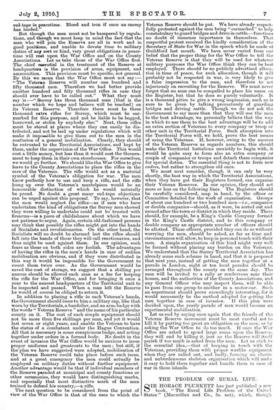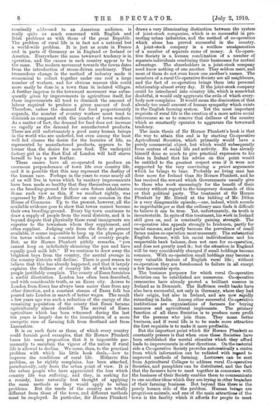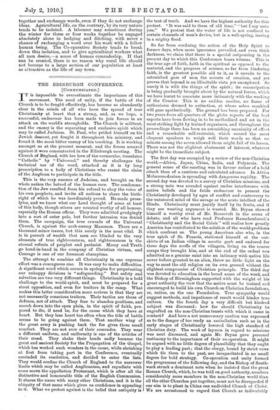THE PROBLEM OF RURAL LIFE.
SIRSIR HORACE PLUNKETT has just published a new " The Rural Life Problem of the United States " (Macmillan and Co., 5s. net), which, thoug!i nominally addressed to an American audience, is really quite as much concerned with English and Irish problems as with those of the great Republic. The problem of rural life is in fact not a national but a world-wide problem. It is just as acute in France and in parts of Germany as in England or Ireland or America. Everywhere the same townward tendency is in operation, and the causes in each country appear to be the same. The modern movement towards the towns dates from the introduction of steam-driven machinery. That tremendous change in the method of industry made it economical to collect together under one roof a large number of workers, and for obvious reasons this could more easily be done in a town than in isolated villages. A further impetus to the townward movement was subse- quently given by improvements in agriculture itself, for these improvements all tend to diminish the amount of labour required to produce a given amount of food. Therefore, unless the demand for food proportionately expands, the number of country workers must tend to diminish as compared with the number of town workers. As a, matter of fact, the demand for food does not increase so rapidly as the demand for manufactured products. There are still unfortunately a good many human beings in the world who are underfed, but even among the least well fed classes the desire for the luxuries of life, as represented by manufactured products, appears to be keener than the desire for more food. The underpaid factory girl in the East End of London will half starve herself to buy a new feather.
These causes have all co-operated to produce an enormous preponderance of town life over country life, and it is possible that this may represent the destiny of the human race. Perhaps in the years to come nearly all of us will live in towns which by sanitary improvements have been made so healthy that they themselves can serve as the breeding-ground for their own future inhabitants. Some such view as this, if we recollect rightly, was expressed by Mr. Arthur Balfour on one occasion in the House of Commons. Up to the present, however, all the available evidence goes to show that towns cannot become their own breeding-ground. Every big town continues to draw a supply of people from the rural districts, and it is beyond dispute that physically these rural immigrants are superior to the townsmen whom they supplement, and often supplant. Judging only from the facts at present available, it seems impossible to keep up the physique of the towns without a constant influx of country people. But, as Sir Horace Plunkett pithily remarks, " you cannot keep on indefinitely skimming the pan and have equally good milk left." If we continue to draw away the brightest boys from the country, the mental average in the country districts will decline. There is good reason to believe that this has already happened, and that it largely explains the dullness of country life of which so many people justifiably complain. The county of Essex furnishes a useful illustration. London has often been described, and with considerable truth, as an Essex city. Access to London from Essex has always been easier than from any other direction, and a constant stream of Essex folk has poured into London in search of better wages. The result a few years ago was such a reduction of the energy of the remaining population of the county that Essex became agriculturally almost derelict. The revival of Essex agriculture which has been witnessed during the last ten years is largely due to the immigration of a more energetic race of farming folk from Scotland and from Lancashire.
It is on such facts as these, of which every country could furnish good examples, that Sir Horace Plunkett bases his main proposition that it is impossible per- manently to maintain the vigour of the nation if rural life is allowed to decline. We come, then, to the practical problem with which his little book deals,—how to improve the conditions of rural life. Hitherto this problem, as he rightly complains, has been attacked, paradoxically, only from the urban point of view. It is the urban people who have appreciated. the loss which country life was suffering, and they, in seeking for a remedy, have naturally first thought of applying the same methods as they would. apply to urban problems. But the needs of the country are totally different from those of the town, and different methods must be employed. In particular, Sir Horace Plunkett draws a very illuminating distinction between the system of joint-stock companies, which is so successful in pro- moting urban industries, and the method of co-operation which alone has proved successful in the country. A joint-stock company is a soulless amalgamation of a number of separate sums of money. A Co-opera- tive Society is a human combination of a number of separate individuals combining their businesses for mutual advantage. The shareholders in a joint-stock company need know nothing of one another. They seldom meet, and most of them do not even know one another's names. The members of a rural Co-operative Society are all neighbours, and the fact of co-operation brings -them into personal relationship almost every day. If the joint-stock company could be introduced. into country life, which is somewhat doubtful, it would only aggravate the evils of which every- body now complains. It would mean the diminution of that already too small amount of human sympathy which exists in the English farming system. Yet the most important requisite of rural life is the creation of a more active social intercourse so as to remove that dullness of the country which so constantly operates to aggravate the townward tendency. The main thesis of Sir Horace Plunkett's book is that the way to attain this end is by starting Co-operative Agricultural Societies, which primarily would. have a, purely commercial object, but which would subsequently form centres of social life and activity. He has already himself done so much to give practical expression to his ideas in Ireland that his advice on this point would. be entitled to the greatest respect even if it were not supported by the very convincing a priori arguments which he brings to bear. Probably no living man has done more for Ireland than Sir Horace Plunkett, and he has received the reward which Governments usually give to those who work unceasingly for the benefit of their country without regard to the temporary demands of this or that political party. The treatment of Sir Horace Plunkett by Mr. Birrell at the bidding of Mr. Dillon is a very disagreeable episode,—one, indeed, which sounds so improbable per se that the ordinary man finds it difficult to believe it can be true. Yet, unfortunately, its truth is incontestable. In spite of this treatment, his work in Ireland still goes on, and is constantly gaining strength. The co-operative idea appeals strongly to Irishmen, partly for racial reasons, and partly because the prevalence of small farms makes co-operation most necessary. The substantial English farmer, with his racial individualism and his respectable bank balance, does not care for co-operation, and does not greatly need it; but the situation in England. will be very considerably changed if small holdings become common. With co-operation small holdings may become a very valuable feature of English rural life; without co-operation they are foredoomed to failure in all except a few favourable spots.
The business purposes for which rural Co-operative Societies can be established are numerous. Co-operative creameries have already proved a brilliant success in Ireland as in Denmark. The Raffeison credit banks have also been successful, not only in Germany, where they had their origin, but also in Ireland, and are now rapidly extending in India. Among other successful Co-operative institutions are organisations of farmers for buying manures and agricultural implements. The primary function of all these Societies is to produce more profit for the persons who join them. They mean better business, and if rural life is to be made more attractive the first requisite is to make it more profitable.
But the important point which Sir Horace Plunkett so constantly presses is that when once these Societies have been established the mental stimulus which they afford leads to improvements in other directions. On the material side a Co-operative Society provides automatically a centre from which information can be radiated with regard to improved methods of farming. Lecturers can be sent from Agricultural Colleges to address rural Co-operative Societies, and pamphlets can be distributed, and the fact that the farmers have to meet together in connexion with the business of their Society enables them to communicate to one another ideas which they are trying in other branches of their farming business. But beyond this there is the purely human side of the problem. Human beings are gregarious animals, and one of the main attractions of the town is the facility which it affords for people to meet together and exchange words, even if they do not exchange ideas. Agricultural life, on the contrary, by its very nature tends to be isolated. A labourer may sometimes during the winter for three or four weeks together be engaged absolutely alone in hedging and ditching, with never a chance of exchanging a word over his work with a fellow human being. The Co-operative Society tends to break down this isolation, and to give agricultural workers what all men desire,—a sense of human comradeship. If that can be created, there is no reason why rural life should not become to a large section of our population at least as attractive as the life of any town.




















































 Previous page
Previous page